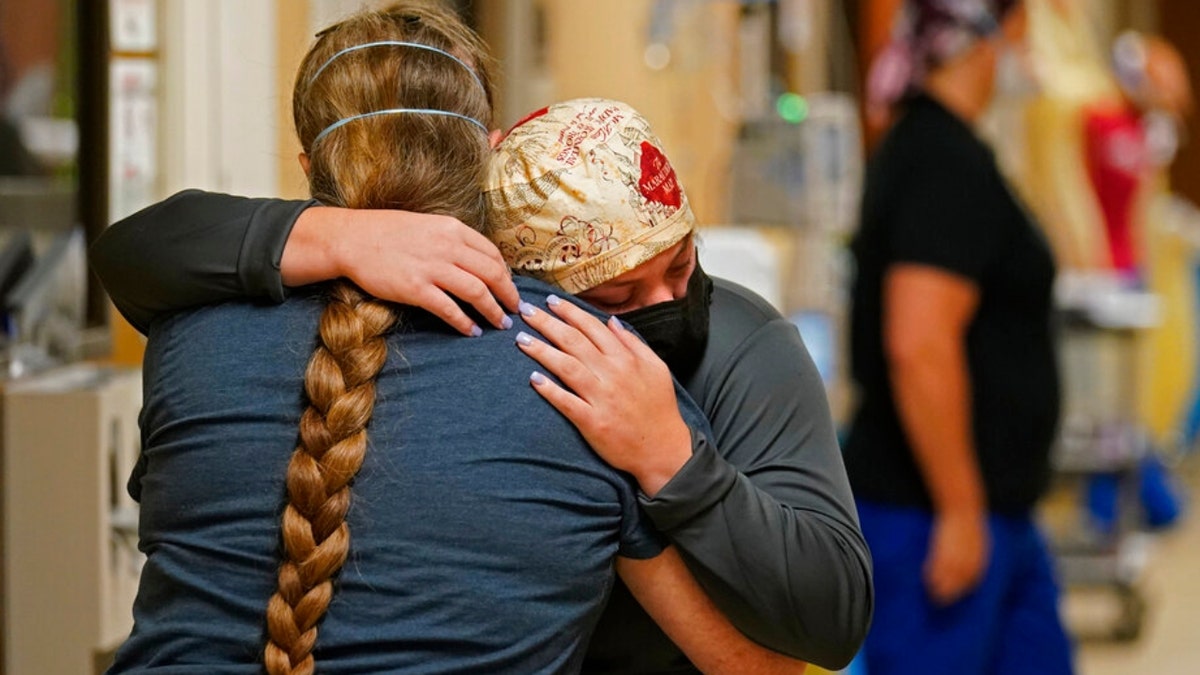California experiencing health care worker shortage, now asking COVID-positive nurses to work
California nurse Jen Peters was fired for refusing the COVID-19 vaccine and is speaking out against the hypocrisy of hospitals now allowing COVID-positive nurses to keep working
Covid-19 has added to caregiver fatigue according to health experts. Caregiver fatigue occurs when the caregiver of an individual feels physically and emotionally exhausted, often leading to a change in attitude, negative feelings toward the role and the care recipient and sometimes feelings of resentment, according to health experts.
"We encourage families to try to plan ahead. It can be difficult to face an older loved one’s changing needs, but if you have plans in place for how your family/network will support the primary caregiver in both big and everyday ways you’ll be ahead of the curve," Seniorly Vice President of Partnerships and gerontologist Marlena Del Hierro said in a statement to Fox News.

Registered nurse Bryan Hofilena attaches a "COVID Patient" sticker on a body bag (AP Photo/Jae C. Hong, File)
ALZHEIMER'S DISEASE IMPACTING 6.5M OLDER AMERICANS
"Decide who can take over certain errands. Look up local caregiver support groups for them. Find out how to get respite care, which can give caregivers a much-deserved break, but more importantly can be vital information if the caregiver has to attend to an emergency or other urgent situation," Del Hierro also told Fox News.
Caregiver fatigue is a growing concern now that a record 42 million Americans are caregivers for an aging parent, spouse or individuals struggling with daily activities, according to a recent report. That number is expected to grow as the population of Americans 65 and older is projected to grow by almost 50 percent between now and 2040, according to a report in Seniorly.

ICU nurse Melinda Hunt, facing, hugs the sister of a COVID-19 patient she had been caring for, who had just passed away (AP Photo/Gerald Herbert, File)
COVID LONELINESS CRISIS – HERE'S HOW YOU CAN FIGHT THIS PANDEMIC SIDE EFFECT
While caring for a loved one can be rewarding, caregivers may also be at increased risk for negative health consequences such as stress, difficulty maintaining a healthy lifestyle, depression, and staying up to date on their own recommended clinical preventive services according to a report by the Centers for Disease Control and Prevention (CDC).
To help manage caregiving, Seniorly offered these tips:
- Build a community with other caregivers. With millions of Americans providing unpaid care, services for loved ones that means you are not alone. Other caregivers can be important resources for helping you cope and navigate your role.
- Take care of yourself: In order for you to be a good support to others, you have to ensure that you take time for yourself and to ensure that your body and mind are as healthy as they can be, including looking out for signs of depression or burnout.
- Stay organized: Make sure you have all documents you need, including power of attorney if necessary when you speak to your loved one's medical care team. Write down the medications your loved one takes and document any procedures they undergo.
- Ask for help and be specific: If you have had offers of help from people in your circle, determine what tasks they would be willing to do and assign them the job. Laundry, grocery shopping, cooking, or rides can be delegated out to willing helpers.
- Consider respite care: Respite care can provide short-term care to give primary caretakers a break, or time to participate in other commitments. Some senior communities offer short-term stays where seniors can get assisted living help while their families are away or occupied. Some organizations provide respite grants, to help offset the cost of temporary services.
- Take advantage of technology: There are smart home devices that can make it simpler (and less invasive) to keep an eye on elderly loved ones and keep them safer at home. Using grocery and meal delivery services like UberEats, and Instacart can help save time and eliminate some tasks. Apps like Gogo Grandparent helps seniors use smartphone apps, like Lyft or Uber, without a smartphone. There are also apps specifically designed to help caregivers keep track of tasks and important information.
- Consult cultural organizations: Sometimes families find it difficult to accept outside help. This might be due to family preferences or cultural perceptions of caregiving. Local community centers or religious organizations might be able to provide you with resources as well as guidance.
- Investigate your state's Medicare offerings: Some states, like California, offer programs like Medi-Cal's In-Home Supportive Services. This program can help you pay for necessary care in your own home, like housekeeping, meal prep, laundry, and personal care like help with bathing and grooming.

Registered nurse Sara Nystrom, of Townshend, Vt., prepares to enter a patient's room in the COVID-19 Intensive Care Unit (AP Photo/Steven Senne, File)
CLICK HERE TO GET THE FOX NEWS APP
Del Hierro also told Fox News that caregivers should not be afraid to ask physicians and care managers for advice since they will likely have knowledge on local resources that families can turn to for regular and crisis services.
